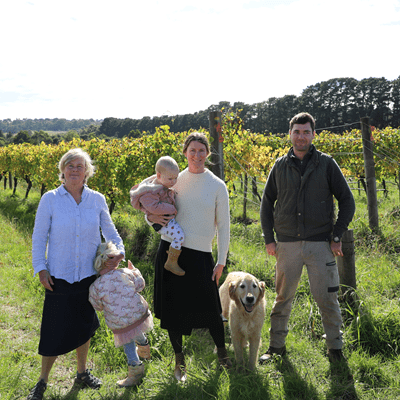Tell us in a few sentences about your experience as a viticulturist, how did you arrive here?
Quealy Winemakers are viticulturalists first. Their Pinot Noir, Pinot Gris and Chardonnay is planted across five heritage vineyards in the subregions of Balnarring, Merricks North, Red Hill and Main Ridge.
Our home vineyard was planted upon an orchard in 1982. The varieties remaining from that era are our 17 Rows of Pinot Noir and the Chardonnay and Riesling that are Pobblebonk. We planted Friulano, Pinot Grigio, Moscato Giallo and, more recently, Malvasia Istriana.
The entire vineyard is located on a gentle north-facing slope. The soils are shallow loams over sticky clay. We focus on organic matter incorporation to assist the soils capacity.
Even so, the soil dries out earlier than Red Hill forcing the vines to mature in the warmer autumn months.
Of interest, the whites are delicate and acid whilst the Pinot Noir is heavy and brooding.
Quealy Winemakers are driven to attaining the finest expression of single sites on the Mornington Peninsula. From these five sites are six vineyard-plot designated Pinot Noir, five Pinot Gris, two Chardonnay, two sulphur free sparkling wine and serious skin contact amber wine made in clay amphora. Their Turbul Friulano is spearheading the Skin Contact wine movement in Australia.
It’s all dry grown, hand-picked and made under the watchful eyes of a family of winemakers and viticulturalists.
Why did you decide to apply to be an EcoGrower, was there something specific that influenced your decision and/or had you attended a previous EcoVineyards session?
We believe the good wines starts with the soil and over the years we have consistently dedicated significant energy to building soil health and fostering biodiversity in our vineyard and the surrounding land. Quealy Wines is built around innovation, and we are always seeking new knowledge on how to car for the land and improve our wines. When we heard about EcoVineyards we knew this program would help us take the next step in increasing biodiversity in our vineyards.
Has there been a defining moment or catalyst for you to move towards more ecologically driven viticultural practices?
Our move towards more ecologically driven viticulture has been a constant journey driven by a love of the land and an appreciation for how soil health impacts vineyard health and wine quality.
Can you provide a brief overview of your project ideas, and what you wish to achieve over the 3 years and why is this important to you?
We are looking to trial indigenous ground covers under vines in a new planting with a view to reducing soil disturbance and tractor passes from mowing, and in doing so improve soil health and biodiversity. We will also build on this by planting indigenous shrubs at row ends to encourage beneficial insects and wildlife.
Are you just starting to learn, or have you been enhancing biodiversity on your property and is this an extension of what you are currently doing?
This project is an extension of what we are already doing. The Quealy home site includes a large area (including a dam) which has been dedicated to a large biodiversity planting for a long time. A huge variety of native and indigenous plants and trees exist in this part of the property.
We have also been certified Organic for several years and practicing organic principles for many more years due to our understanding of the negative impacts synthetic chemicals have on the harmony of natural systems.
Where do you see grape growing in the future, do you feel there is an urgency to change current practices? If so, why?
We are not alone in the winemaking community in our recognition that, as farmers and stewards of the land, we cannot continue to work against nature in our pursuit of harvesting produce. Instead, we must learn to work with nature and its innate processes to harness the natural vitality that exists within our soils.
The movement towards organics, regenerative farming, and ecologically sound practices is heartening and we are honoured to have the opportunity to care for this land as we learn and grow.

